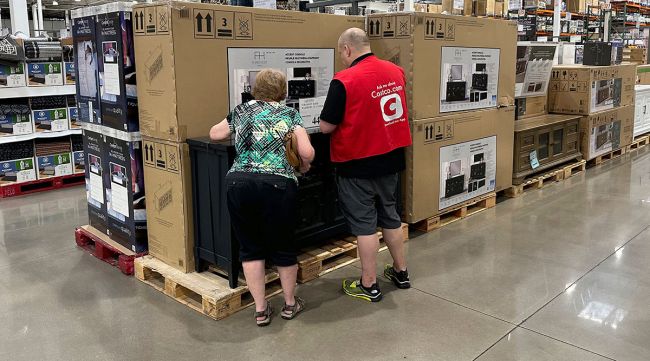Americans are feeling less confident financially as summer comes to a close and high prices and interest rates weigh on their willingness to spend.
There were also signs Aug. 29 of cooling in what has been a resilient U.S. jobs market.
The Conference Board, a business research group, said its consumer confidence index tumbled to 106.1 in August from a revised 114 in July. Analysts were expecting a reading of 116.
August’s swoon — which has somewhat mirrored the stock market decline this month — erased gains from June and July.
The index measures both Americans’ assessment of economic conditions and their outlook for the next six months. Both measures saw significant declines in August.
Consumers’ view of current conditions fell to 144.8 from 153, and the index for future expectations slid to 80.2 from 88 in July. Readings below 80 for future expectations historically signals a recession within a year.
Consumer spending accounts for around 70% of U.S. economic activity, so economists and investors pay close attention to their mood to gauge how it may affect the broader economy.
Confidence appeared to rebound late in the spring as inflation eased in the face of 11 interest rate hikes by the Federal Reserve. But this month’s downturn reflects consumer anxiety over spending on nonessential goods, particularly if they have to put it on a credit card with an elevated interest rate.

A line of used luxury sports cars sit at a McLaren dealership Aug. 27 in Highlands Ranch, Colo. (Associated Press/David Zalubowski)
The cost of everyday, essential items also has consumers frustrated.
“Write-in responses showed that consumers were once again preoccupied with rising prices in general, and for groceries and gasoline in particular,” said Dana Peterson, chief economist at The Conference Board. She said the retreat in consumer confidence was evident across all age groups.
The downturn in spending has showed up in the earnings reports of many high-profile retailers. Target recently reported its first quarterly sales decline in six years earlier this month, dragged down by cautious spending. Home Depot, the nation’s largest home improvement retailer, said that sales continue to decline, with a fall-off in big-ticket items like appliances and other things that often require financing.
On Aug. 29, Best Buy reported that its sales and profits slid in the second quarter as the nation’s largest consumer electronics chain continues to wrestle with a pullback in spending on gadgets after Americans splurged during the pandemic.
The U.S. economy — the world’s largest — has proved surprisingly resilient in the face of sharply higher borrowing costs. Employers are adding a strong 278,000 jobs a month so far this year; and at 3.5% in July, the unemployment rate is not far off a half-century low.

Ryan Manthir of Shell Global Solutions and Michael Grahe of Navistar discuss the future of the internal combustion engine. Tune in above or by going to RoadSigns.ttnews.com.
Tumbling inflation and sturdy hiring had raised hopes the Fed just might pull off a so-called soft landing — slowing the economy just enough to tame inflation without tipping the United States into recession.
But recent data suggests that Americans might be tightening their budgets as the school year begins, and with the all-important holiday season just a couple months away.
Also on Aug. 29, it was reported that businesses posted far fewer open jobs in July, and the number of Americans quitting their jobs fell sharply for the second straight month, clear signs that the labor market is cooling in a way that could reduce inflation.
The number of job vacancies dropped to 8.8 million last month, the Labor Department said, the fewest since March 2021 and down from 9.2 million in June.






